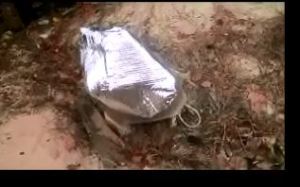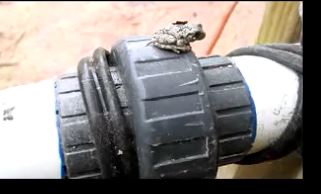Oh yeah, there’s a super-cute baby frog in the video… see below!
We’ve said it before, and we’re saying it again: winter can be rough on well equipment. Although heat tape, insulated fake rocks, and pipe wrap can do alot to keep your equipment safe, it is only effective if you can prevent air exchange from inside and outside the equipment cover.

Of course we always recommend thermostatically controlled heat tape instead of a lamp, because lamps can cause fires. Also, we recommend non-fiberglass pipe wrap and insulation over fiberglass, because not only does fiberglass lose its insulating value when it gets wet, it also provides nesting material for rodents (ewww)
Lastly, we always want to make sure our clients’ water systems are protected from air exchange.
In this video, a Stone Mountain manufacturing plant did not fix the grade after they backfilled their water lines (they did not contract us to install these lines). This created a low spot in the yard and water pooled there, eventually breaking down the berm behind the well head and causing a rill to run right thru the well equipment location. Because it is impossible to seal up the base of the rock, we are concerned about the equipment freezing, despite all the protective measures we employed when we built the system.
Although a solid, tight “cigar roll” of pinestraw around the base of a fake rock may be sufficient if the rock is in good contact with the ground, the best way to insure NO air exchange is to bury the edges of the rock with 3-6″ of soil.

